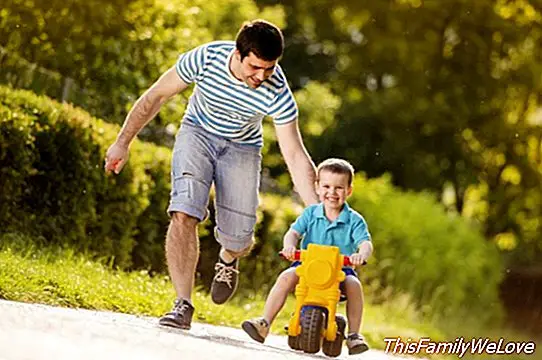Hyperpaternity, when the care of children becomes excessive

If you had to summarize the task of parents in this world this could be done in two verbs: caring and educating. On the one hand ensure the safety and integrity of children so that nothing bad happens to them, on the other hand teach values and make them excellent people who contribute something to society. However, are there times when the parents they exceed?
Yes, in some cases many hyperparents go beyond simple care and end up creating a bubble that in tends to be harmful for the little ones. It is what the writer Eva Millet defines as hyperpaternity, a phenomenon that encompasses the new parenting model that parents have made in recent years. The problem is that they confuse "caring" with "protecting" when their work, with education, is to make them autonomous.
Children, the center of everything
According to the definition of hyperpaternity, in recent years the model of parenting at home has gone from the model of furniture to the altar. In past generations if the child was upset, the parents opted to leave him in his air without leaving him to monitor, ignore this behavior and continue with their duties until the child desisted in his tantrum.
However, in recent times children have been monopolizing More attention in this situations. The child becomes the center of attention and attention when he has a tantrum, so the child assimilates that this must be his behavior whenever he wants his environment to be fixed on him and claim the interest of all.
Parents mats
In recent times parents have become a kind of safety net for your children. These parents anticipate all desire in children and solve any problem they may present without giving the opportunity to them. An attitude that makes the little ones not assimilate the concept of responsibility because they always know that even if they fail, they will have a mattress that will prevent disaster.
A good example is the children's bed. Leave the fourth collected It is one of the obligations that every child must assimilate, who is responsible for their room. However, sometimes they forget this work, to which many parents respond assimilating them themselves. A behavior that makes the child understand that nothing happens.
Let them make mistakes
Parents who practice hyper-parenting should let their children make mistakes, encourage their autonomy and learn to manage themselves adverse situations to learn lessons from them.
For example, if one day at school they forgot a certain material, they have to know that it is up to them to watch their backpack next time and not to expect the adults to assume this task for them.
In this way the character of the child will mature and learning to assume responsibilities facing adulthood. In addition, not giving all this attention to the children will also help to improve their self-esteem as revealed by a study of Therefore, according to the study conducted at Brigham Young University in Utah, United States.
According to this work, those overprotective parents who are determined to make important decisions for their children and to fix all their problems, intervening in their conflicts with the pretext that the little ones do not suffer, end up doing more damage to the children of whom they intend to avoid, for much heat and encouragement that they believe to be giving them.
Damián Montero




